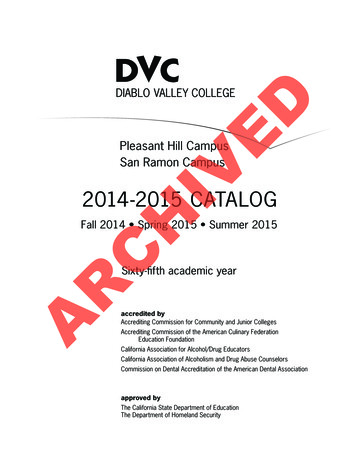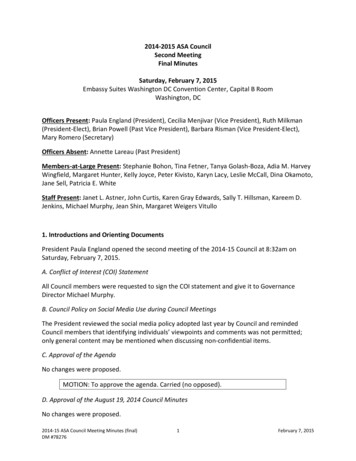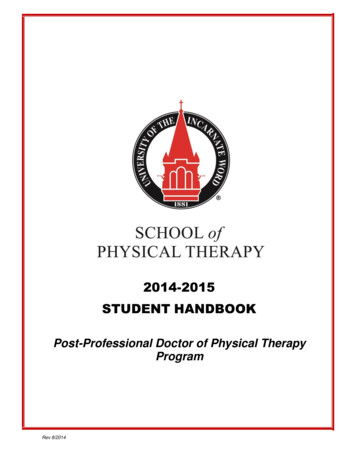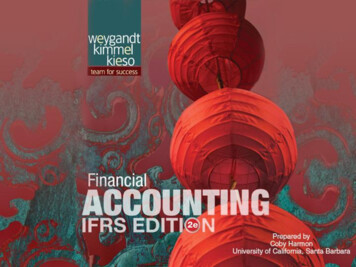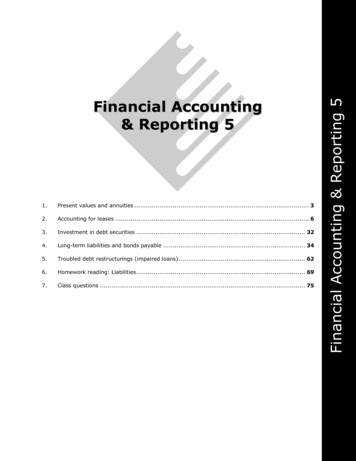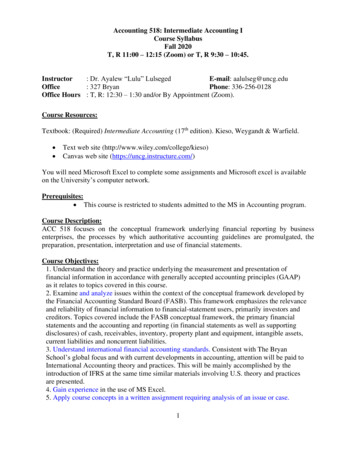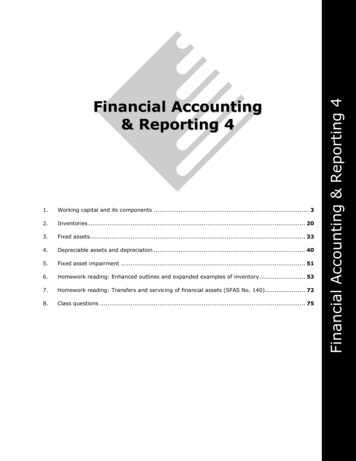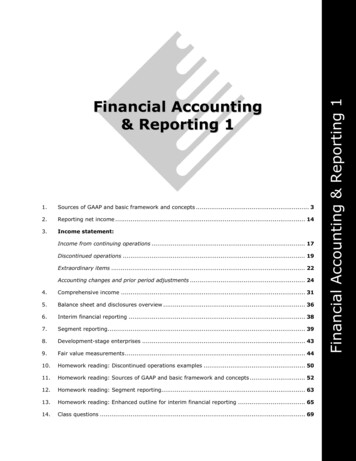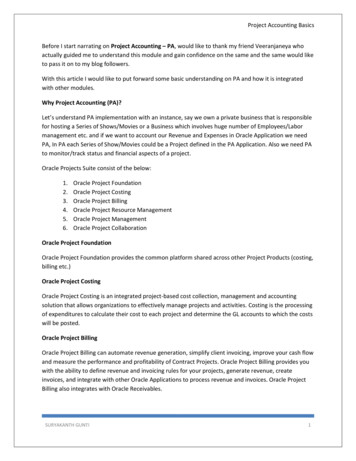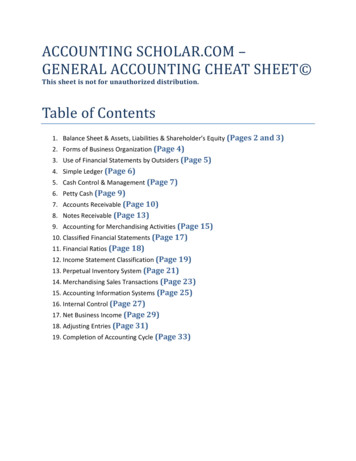![ACCOUNTING HANDBOOK 2014-2015[2] - UMSL](/img/6/handbk.jpg)
Transcription
1UMSL ACCOUNTINGPROGRAMS HANDBOOKA Guide for Accounting Students at the Universityof Missouri-St. Louis2018-19 EditionMISSION OF THE ACCOUNTING DEPARTMENTTo foster excellence in accountancy by: Providing a rigorous educational experience as a framework for lifelong learning toindividuals of diverse academic backgrounds Creating, expanding and disseminating knowledge through scholarly activities Serving the academic, professional, and business /accounting/acctg.html
2What You Can Learn in this Handbook:Why study Accounting?What makes UMSL Accounting degrees valuable?What do I need to know if I am a transfer student?What Degree programs are available to me?How do I get admitted into the UMSL Graduate Business College?If I am a current student, can I earn early admission into the Master ofAccounting program?What is the Graduate Management Admissions Test (GMAT)?How do I become a CPA?Is financial assistance available?Are there paid accounting internships? (Spoiler alert: a lot!)What do UMSL Accounting students do besides study?When and how do I get a full-time position?Will I be remembered when I graduate?Where can I learn more?
3Why Study Accounting?The CPA profession is dynamic, intellectually rewarding, and lucrative. Our graduates earn entrylevel positions, earn the Certified Public Accountant designation and other professionaldesignations, and then rise to high-ranking positions such as “C-Suite” corporate executive roles,CPA firm senior managers and partners, internal audit executives, information systems auditorsand executives, lawyers, investment bankers, entrepreneurs, risk management executives, not-forprofit corporation and agency leaders, governmental agency leaders, high school teachers, andUniversity professors. As you can see, a degree in Accounting opens the door to vastopportunities.
4What Makes UMSL Accounting Degrees Valuable?The UMSL Accounting curricula prepare graduates well. Our alumni are leaders at local,regional, national, and international Certified Public Accountant (CPA) firms, Corporations, notfor-profit corporations and agencies, and government agencies across the globe. Our graduateslaunch their careers at leading CPA firms such as Anders, BDO, BKD, BSW, Deloitte, E&Y,CLA, KPMG, PWC, RubinBrown, Mueller Prost, and UHY, at leading corporations such asAmeren, Anheuser-Busch InBev, BJC Healthcare, Boeing, Centene, Edward Jones, Emerson,Enterprise, Express Scripts, Laclede Gas, SSM Healthcare, and Wells Fargo, and at leadinggovernment agencies like the FBI, the Federal Reserve, and the FDIC. Our graduates also passthe CPA Exam at rates far beyond the national average.The Accounting Faculty at UMSL is committed to seeing such success come to every graduatingclass. Our faculty is composed of full-time scholars who teach day and evening courses in boththe undergraduate and graduate programs. The professors hold PhDs from top academicaccounting programs including Indiana University, the University of Utah, Drexel University,and Virginia Tech. In addition to extensive academic experience, our faculty members averageover 10 years in professional practice with prestigious organizations such as EY, PWC, Deloitte,Anheuser Busch InBev, and Citicorp. The faculty is also active in research and have publishedtheir research in leading accounting journals such as The Accounting Review, Journal ofAccounting & Economics, Accounting Horizons, Contemporary Accounting Research, Issues inAccounting Education, Journal of the American Taxation Association, and the Journal ofAccountancy. You will find your Professors on campus and readily available to answer yourquestions or discuss your career aspirations.We also have outstanding student services available for our students. We have a staff of fulltime advisors for the undergraduate and graduate academic programs to help you plan yourstudies. We also have an outstanding Career Placement Office that facilitates interviews withorganizations seeking to hire our accounting students. The Career Placement professionals areavailable any time to help you with resumes and interviewing skills. Seehttp://www.umsl.edu/depts/career/
5What Do I Need to Know if I Am a Transfer Student?If you are transferring to UMSL, we WELCOME you with open arms and we work to make yourtransition seamless. Many students each semester transfer to us from community colleges, othercampuses of the University of Missouri system, and colleges and universities around the globe.To get started, make sure your application is completed in a timely manner so that you can beadmitted and register for the classes you want. A complete application includes transcripts ofcoursework taken in high school and other colleges and universities. Only you can request tohave these transcripts sent to UMSL from those institutions, as they contain confidentialinformation. You can apply on-line http://www.umsl.edu/admissions/apply-now.html.Make an appointment to see an Academic Advisor in the College of Business Administration.They will help you plan your course of study and select courses based on a review of yourtranscript. Consulting an advisor early is important to help you identify how your previouscoursework will transfer to UMSL and which previously taken courses are equivalent to Collegeof Business Administration courses. We recommend that you visit an academic advisorregularly during your program to learn about changes in curricula and to help you stay on track.Contact the College of Business Administration Office of Undergraduate Studies to request aninformation packet or to schedule an appointment. You can call them at (314) 516-5888 or visitthem personally on the first floor of Anheuser-Busch Hall (Suite 107).You should expect the University of Missouri-St. Louis to be different from your previouseducational institution. UMSL is one of four Universities that comprise the research universitysystem in Missouri. We feature rigorous academic programs with high expectations ofperformance for its faculty and its students. Even if you have attended a college or universityelsewhere, it is important to understand the expectations of your UMSL instructors and fulfillthem in order to successfully complete a degree at this institution. Accounting faculty membersare very accessible by phone, e-mail, or by visiting their offices. Take advantage of theirpresence on campus to get help with class work, to find helpful campus resources, and to helpyou understand the accounting program and profession.
6What Degree Programs are Available?Bachelor of Science in Accounting (B.S.A.)The Bachelor of Science in Accounting (BSA) degree program is a 120-credit hourprogram that requires at least 60 hours to be taken outside of the College of BusinessAdministration. The general education and business core course requirements are the sameas those for the Bachelor of Science in Business Administration (BSBA) degree program.In addition, there are six required accounting courses at the 3000 level or greater. Thesecourses are the following:ACCTNG 3401ACCTNG 3402ACCTNG 3421ACCTNG 3411ACCTNG 3441ACCTNG 4435Financial Accounting & Reporting IFinancial Accounting & Reporting IIAccounting Information SystemsCost AccountingIncome TaxesAuditingA sample program is provided below. [Note: If you want to qualify to sit for theCPA examination in Missouri, you must have 150 credit hours of coursework.Options for fulfilling this requirement are discussed later.A sample eight-semester plan of study for completing the Bachelor of Science inAccounting (B.S.A.) degree is provided on the next page.
7Sample Bachelor of Science in Accounting Degree ProgramSemester 1:MATH 1030ENGL 1100Semester 2:MATH 1100ECON 1001Semester 3:MATH 1105ACCTNG 2400ECON 1002INFSYS 2800College AlgebraFreshman CompositionHumanities courseState Requirement courseSocial Science courseBasic CalculusMicroeconomicsHumanitiesScience LectureCultural DiversityProbability and StatisticsFundamentals of Financial AccountingMacroeconomicsSystems Concepts and ApplicationsEthicsSemester 4:ACCTNG 2410 Managerial AccountingSCMA 3300Business StatisticsBUSAD 2900Legal Environment of BusinessSpeechSocial ScienceSemester 5:SCMA 3320Operations ManagementMKTG 3700Basic MarketingACCTNG 3401 Financial Accounting and Reporting IENGL 3120Business WritingGlobal Awareness ElectiveSemester 6:FINANCE 3500MGMT 3600ACCTNG 3402ACCTNG 3421Semester 7:ACCTNG 3411ACCTNG 4435Semester 8:ACCTNG 3441MGMT 4219MGMT 4220Financial ManagementManagement and Organizational BehaviorFinancial Accounting and Reporting IIAccounting Information SystemsNon-Business ElectiveCost AccountingAuditingGlobal Awareness ElectiveNon-Business ElectiveElectiveIncome TaxesStrategic ManagementBusiness Assessment TestingElectiveNon-Business Elective
8Master of AccountingThe Master of Accounting (M.Acc.) degree program is intended for students preparing to enter theaccounting profession and working professionals seeking to advance their careers. Completing theMaster of Accounting degree requirements will simultaneously satisfy the minimum educationrequirements to be eligible to take the Certified Public Accountant (CPA) examination in Missouri.The Master of Accounting degree usually requires 30 hours (requirements B and C below) forstudents that hold degree in accounting. If a student holds an undergraduate degree in businessbut with a non-Accounting emphasis, completing the Master of Accounting degree will normallyrequire around 45 credit hours. The degree usually requires 54-60 hours for students that hold anundergraduate degree in a field other than business.Many of our students working full time, so the upper level classes are scheduled in the evening.Prerequisite Courses:Professional Accounting Core (21 credit hours/ 15 upper level Accounting credit hours):ACCTNG 2400Fundamentals of Financial AccountingACCTNG 2410Managerial AccountingACCTNG 3401Financial Accounting and Reporting IACCTNG 3402Financial Accounting and Reporting IIACCTNG 3421Accounting Information SystemsACCTNG 3411Cost AccountingACCTNG 3441Income TaxesMaster of Accounting Curriculum:A. General Business (18 credits)These requirements may be waived with appropriate undergraduate courses.Quantitative Methods:SCMA 5300Statistical Analysis for Management DecisionsFinance Requirement:FINANCE 6500Financial ManagementChoose any four courses from the following:BUS AD 5100Managerial CommunicationBUS AD 5900Law, Ethics, and BusinessBUS AD 6990Strategy Formulation and ImplementationINFSYS 5800Management Information SystemsSCMA 5320Production and Operations ManagementMGMT 5600Organizational Behavior and Administrative ProcessesMKTG 5700Contemporary Marketing Concepts
9B. Master of Accounting Degree Requirements (15 credits):*These requirements may be waived with appropriate undergraduate courses. If courses are waived, students musttake additional accounting electives to meet the minimum credit hour requirement.Core Requirements:ACCTNG 4401ACCTNG 4402ACCTNG 4435Financial Accounting & Reporting IIIFinancial Accounting & Reporting IVAuditing *Graduate Topics Course (Choose one course from the following graduate topics courses):ACCTNG 5403Graduate Topics in Financial AccountingACCTNG 5412Graduate Topics in Managerial Accounting: ControllershipACCTNG 5435Graduate Topics in AuditingACCTNG 6441Graduate Topics in TaxationResearch Course (Choose one course from the following research courses):ACCTNG 5402Professional Accounting ResearchACCTNG 5406Accounting Research and Professional WritingACCTNG 5441Tax ResearchC. Electives (15 credits)Students must complete 15 credits of electives. At least six hours of these electives must be accounting electives. Theother 9 credits can come from either the accounting list or the business list shown below.Accounting Electives:ACCTNG 5402ACCTNG 5403ACCTNG 5406ACCTNG 5408ACCTNG 5412ACCTNG 5435ACCTNG 5436ACCTNG 5441ACCTNG 5446ACCTNG 5480ACCTNG 5490ACCTNG 5491ACCTNG 5498ACCTNG 5499ACCTNG 6441Professional Accounting ResearchGraduate Topics in Financial AccountingAccounting Research & Professional WritingFraud ExaminationGraduate Topics in Managerial Accounting: ControllershipGraduate Topics in AuditingSystems AuditingTax ResearchAdvanced Topics in TaxationInternational AccountingGraduate Accounting InternshipContemporary Issues in AccountancyGraduate Topics in AccountingIndividual Research in AccountingGraduate Topics in TaxationNon-Accounting Business Electives:AnyBUS AD 5000 and aboveAnySCMA 5300 and aboveAnyFINANCE 5500 and aboveAnyMGMT 5600 and aboveAnyMKTG 5700 and aboveAnyINFSYS 5800 and above
10All Master of Accounting degree students must complete at least 15 hours in accounting (aminimum of 12 hours at the 5000-level). To plan your course of study, consult an advisor todetermine when specific courses will be available as some courses are not offered every year.Please check the university’s ex.html for specific courses and course descriptions.
11Master of Business Administration (MBA) – Accounting EmphasisFor students desiring a broader business orientation in graduate study, the MBA is a good choice.Students may fulfill the State of Missouri requirements to sit for the CPA examination throughthe MBA program with emphasis in Accounting only if they already have an undergraduatedegree in Accounting.A. General Requirements:BUS AD 5000BUS AD 5100SCMA 5300B. Core Requirements:ACCTNG 5400BUS AD 5900FINANCE 6500INFSYS 5800SCMA 5320MGMT 5600MKTG 5700Quantitative Skills BootcampEconomics for ManagersManagerial CommunicationsStatistical Analysis for Management DecisionsFinancial and Managerial AccountingLaw, Ethics, and BusinessFinancial ManagementManagement Information SystemsProduction and Operations ManagementManaging People in OrganizationsContemporary Marketing Concepts[Based on a formal review and evaluation of the Graduate Business Programs Office, candidates may begranted waivers in the Business Core section. Waivers depend on the availability of, and performance in,prior coursework. Regardless of the number of courses waived, all students must complete at least 30 hoursto earn the MBA degree.]C. Advanced Topics (*):Students must take at least one course in each functional area: Accounting, Finance,Information Systems, Management, Marketing, and Logistics and Supply ChainManagement.ACCTNG 5401Financial Reporting and Analysis (if 5400 waived)Any approved6000-level course beyond FINANCE 6500 (if 6500 waived)Any approved5000-level course beyond MKTG 5700 (if 5700 waived)Any approved5000-level course beyond INFSYS 5800 (if 5800 waived)Any approved5000-level course beyond SCMA 5320 (if 5320 waived)D. Required Electives:Students must complete a minimum of nine credit hours of elective courses that are graduatelevel and business-related. Elective classes may be applied to an emphasis.E. Global Management (Choose one of the following):BUS AD 6990INTL BUS 5289MGMT 4614Strategy Formulation and ImplementationInternal Business StrategiesEntrepreneurship / Small Business Management[Note: for students with a non-business degree, the Global Management requirement is satisfied only withBA 6990 – Strategy Formulation and Implementation.]
12F. Emphasis:MBA students may obtain an emphasis in Accounting, Finance, Information Systems,International Business, Logistics and Supply Chain Management, Management,Marketing, or Operations Management. Beyond ACCTNG 5400, MBA students seekingan emphasis in Accounting must complete ACCTNG 5401 and a minimum of 9 additionalhours of 4400-level or 5400-level Accounting electives.[Note: Any 4400 or 5400-level ACCTNG course for which the student meets the prerequisites may besubstituted for ACCTNG 5400 and ACCTNG 5401. Only courses that are substantially different from thosetaken for credit in a student’s undergraduate program are acceptable though.]Advisors in the Office of Graduate Programs in Business can assist you in preparing yourapplication packet and planning your course of study. You can call them at (314) 5165885 or visit them in 104 Anheuser-Busch Hall.
13How do I get into Graduate school?To be eligible to apply to any graduate business program at UMSL, you must hold abaccalaureate degree from an accredited college or university and you must demonstrate highpromise for academic success. Admission to the Master of Accounting program is competitive,and all aspects of a student's application (letters of recommendation, previous work experience,grade point average, and performance on the Graduate Management Admissions Test (GMAT))are considered when making admissions decisions.Before your application to a graduate program in business will be considered, youmust submit the completed application and:a. Have official transcripts covering all collegiate academic work sent to the Office ofGraduate Admissions (or the Office of International Student Services for internationalstudents).b. Take the GMAT and have your scores sent to the University of Missouri-St. Louis.c. Forward two letters of recommendation from professors or employers and a currentrésumé to the Office of Graduate Admissions (or Office of International Student Services).Because it takes time to register and prepare for the GMAT, take the test, and have scoresreceived in our office, students are encouraged to write early for information. You may requestinformation about the graduate business programs and apply on- line through the Admissionsweb page:http://www.umsl.edu/admissions/apply-now.html
14Master of Accounting Early Admission PolicyThe Accounting Department provides an admission option for outstanding students at theUniversity of Missouri - St. Louis. The Early Admission option is available to any applicant whomeets ALL of the following criteria: Will earn a B.S. in Accounting or a B.S. in Business Administration at UMSL prior toentering the Master of Accounting program Has an overall undergraduate GPA of 3.0 or higher at the time of application Has completed at least three 3000-level accounting classes at UMSL Has a UMSL upper-level accounting GPA of 3.2 or higherStudents who meet the academic qualifications and deadlines above will receive an expeditedadmission decision, generally within two weeks of their application. This will allow them toregister for graduate classes for the coming semester on a timely basis.**Currently, UMSL policy allows early admission students to register for only one semester before theirBachelor degrees are conferred. Therefore, students who wish to take summer classes (including aninternship for credit) should register for Fall semester classes first, in order to ensure enrollment in theirpreferred Fall classes. Enrollment in an internship for credit and certain summer courses is more flexibleand can be accomplished after graduation.Students who do not meet the qualifications for Early Admission are encouraged to submitcomplete application packages as early as possible. Applications are reviewed on a rolling basisand applicants who are accepted early will be able to register for classes on a timely basis.Advisors in the Office of Graduate Programs in Business can assist you in preparing yourapplication packet. You can call them at (314) 516-5885 or visit them in person in Suite 104Anheuser-Busch Hall.
15What is the GMAT?All applicants to graduate business programs at the University of Missouri-St. Louis are requiredto take the Graduate Management Admissions Test (GMAT). The GMAT is a standardizedassessment that provides business schools with an indication of the intellectual capacity ofapplicants for advanced study.The GMAT measures basic verbal, mathematical, and analytical writing skills that students havedeveloped over a long period of time in your education and work. It consists of an AnalyticalWriting Assessment, a quantitat
The Master of Accounting degree usually requires 30 hours (requirements B and C below) for students that hold degree in accounting. If a student holds an undergraduate degree in business but with a non-Accounting emphasis, completing the Master of Accounting
